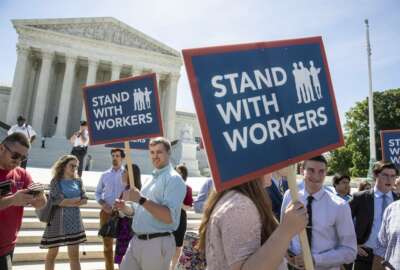When Democrats control the White House, federal (and postal) unions tend to thrive. Or at worst, be left alone by the government. When Republicans are in charge, with some exceptions, not so much.
The Carter, Clinton and Obama administrations provided a friendly climate for unions to operate in government. Bill Clinton first backed a zero pay raise for feds. President Barack Obama presided over three federal pay freezes. But union leaders then, and now, prefer Democratic candidates.
President George W. Bush left unions alone with the exception of the Pentagon’s performance-based-pay plan, which unions objected to and eventually killed. When Republicans control Congress, they frequently press to have private debt-collection services collect back taxes. For a substantial piece of the action. Critics say the taxes are often uncollected because Congress keeps reducing the payroll of the primary federal agency that more than pays for itself.
President Donald Trump has declared Washington to be a swamp, and he wants to make it easier and faster to fire federal workers. A judge last week rejected parts of his executive order, which would have dealt a multi-million dollar blow to federal unions. The EO reduced the amount of official (government paid) time that can be paid to local union officers while on labor-management business. The judge also ordered agencies that had evicted union officers from their government-owned offices to allow them to return.
Although federal and postal unions represent the majority of the non-supervisory workforce, most federal workers (about two-thirds in fact) do not belong to unions or pay union dues. Yesterday’s column listed some reasons, but I missed, according to several readers, the big one: Politics.
“Your Wednesday column was fine but did not go far enough. My objection to unions in the federal government is primarily the political leanings of top leadership. My federal career began with the U.S. Postal Service where I voluntarily joined a craft union. I quit after union leaders in Washington repeatedly and automatically kept endorsing Democratic presidential candidates. While I was a Democrat at the time, I felt it was unwise to inject partisan politics into the job. I also felt that after a series of automatic endorsements the Democrats took us for granted. Still feel that way. After moving to the Social Security Administration, I had the same experience. I joined the union, was happy to pay dues for representation. Until it too continued to endorse Democratic and only Democratic candidates for the highest office. Reluctance to pay dues at least in my case is not the reason I remain outside of the fold.” — Independent
This is what a former Maryland-based Navy civilian says is the primary reason he won’t join a union. He writes:
”This is why I will never support the union that they have at what is now NWSC Philadelphia Division. I originally started work in Annapolis, Maryland, that I believe it’s last name was DTRC (sister lab of Carderock) where there was a union for the shop personal and test mechanics, but not for the white-collar engineers. I was BRACed (moved as a result of the base realignments) to Philadelphia, and actually had to come up before most people, because I had a test to get ready. Even though I was here and was considered a Philadelphia employee, the people in charge of the union vote for white-collar employee representation decided that the Annapolis people couldn’t participate in the vote. That included the people that were hired as Philadelphia employees who were then detailed to Annapolis to help finish testing before facilities could be moved. I think that they thought that the large group of people from Annapolis, all voting no, would have made the vote for the union be like the union vote for Volkswagen, i.e., no union.
“Had I been able to vote, I still would have been a no vote. After 15 years without a union, and never having a problem, and another 18 in Philly, where I am now represented by one, with no need for union help. I see no need for public employees to have a union.” —J.W.
Nearly Useless Factoid
By Michael O’Connell
Black salt is created by mixing harad seeds with salt water. When the black lumps of salt are ground, the resulting powder looks pink.
Source: Listverse
Copyright
© 2024 Federal News Network. All rights reserved. This website is not intended for users located within the European Economic Area.
